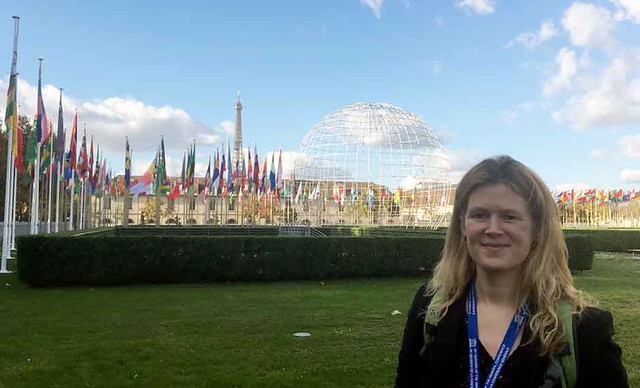This year, for the first time, NGOs (Non-Governmental Organisations) were invited to participate in the Swedish delegation at the UNESCO General Conference in Paris. VA was one of ten NGOs, active in UNESCO’s programme areas of education, science and culture, represented in the Swedish delegation.

The UNESCO General Conference is held every two years and gathers Member States, Associate Members and Observers from non-Member States and other organisations. As an Observer, VA was able to participate in the general negotiations as well as additional Swedish and Nordic meetings. VA also had full access to UNESCO’s Fontenoy Headquarters as well as the Delegations’ Miollis building in Paris. The Nordic countries held joint meetings prior to the sessions run by the various Programme Commissions.
The Programme Commissions’ work is central to the General Conference. There were six Commissions at this year’s conference: SC (Science Commission), SHS (Social and Human Sciences Commission), ED (Education Commission), CI (Communication and Information Commission), CLT (Culture Commission) and APX (Administration and Programme Commission). There are also other committees that deal with elections for Unesco’s various bodies.
VA participated in the work of both scientific Commissions, which addressed issues such as the status of researchers, ethical principles relating to climate change, and decisions on an International Day of Light (on 16 May), a climate change strategy and an International Decade of Ocean Science.
Numerous side events
Parallel side events were held during each of the meeting days and Sweden co-organised and/or funded several of them. Examples included a seminar on GO-Spin – Global Observatory of Science, Technology and Innovation Policy Instruments; a report on World Trends in Freedom of Expression and Media Development attended by the Swedish Minister of Culture, Alice Bah Kuhnke (MP); and the project launch of Our Rights, Our Lives, Our Future: Sweden’s support to UNESCO for expanding comprehensive education in Africa attended by Sweden’s Minister of Education, Gustav Fridolin (MP), who led the Swedish delegation.
There was also a dedicated meeting space for NGOs with a programme of activities. Unesco organises NGO Forums several times a year, and, for the first time, a forum on scientific issues is provisionally planned for 2018.
Discussions and negotiations
”It was interesting to observe from close quarters how a global organisation works. For VA, it was particularly beneficial to follow the revision of a recommendation on the status of scientific researchers. Intense negotiations took place, involving amendments suggested at a late stage and several adjournments of the meeting before an agreement was reached. Finally, the new recommendation was accepted, and formally adopted in plenary. This may well form a good basis for discussions about the role of researchers in today’s society,” said Maria Lindholm, Director of Research and VA’s representative at the General Conference.
”It was also fascinating to see how a UN body works in practice, with active participation from 195 countries and talks spanning national, linguistic and continental borders. In addition, UNESCO’s main building is impressive, both in terms of architecture and art. If you don’t know a lot about Unesco, it is not easy to find out about all of the exiting activities that the organisation undertakes. For example, Unesco has been working for a long time on bioethics, and there are many reports to dig into in its virtual bookstore,” added Maria Lindholm.
Citizen science toolbox
Prior to the General Conference, Unesco held a Youth Forum. The conclusions of the forum were reported in each Commission and, according to the Swedish delegation, there was an unusually strong reference to science this year. For example, the role of young researchers in science in the future was emphasised, as well as the importance of scientific results to young people.
One concrete proposal was for the Youth Forum, together with Unesco, to create a Citizen Science toolbox, and in Sweden’s comments on the proposal, VA was mentioned as a national organisation with expertise in citizen science. At the General Conference, it was also decided that in the future the Youth Forum would be held in the year preceding the General Conferences so that the forum could provide concrete inputs to the planning of the General Conference, which would in turn give young people more influence.
”The Swedish delegation works in an extremely professional way. Daily reports are distributed to the delegation each evening, it holds morning meetings and its statements are well-prepared and formulated,” said Maria Lindholm.
Maria appreciated being part of the delegation and gained considerable inspiration for VA’s ongoing work. VA had several valuable meetings with officials at the UNESCO Secretariat, which will hopefully lead to concrete exchanges and collaborations in the future.
”There was a lot of interest in the issues that VA works with, such as European Researchers’ Night and attitude surveys,” added Maria Lindholm.
A total of ten Swedish NGOs [1] were represented during the General Conference, which took place between 30 October and 14 November 2017, and brought together around 3,000 participants from 195 countries.
[1] The participating Swedish Non-Governmental Organisations were:
- Swedish Union of Journalists
- World Heritage Sweden
- Klys (the Swedish Joint Committee for Artistic and Literary Professionals
- LSU, the National Council of Swedish Youth Organisations
- Swedish Folk High School’s International Programme
- Swedish Teachers’ Union
- Reporters without Borders
- RFSU (the Swedish Association for Sexuality Education)
- Young Academy of Sweden
- VA (Public & Science)

